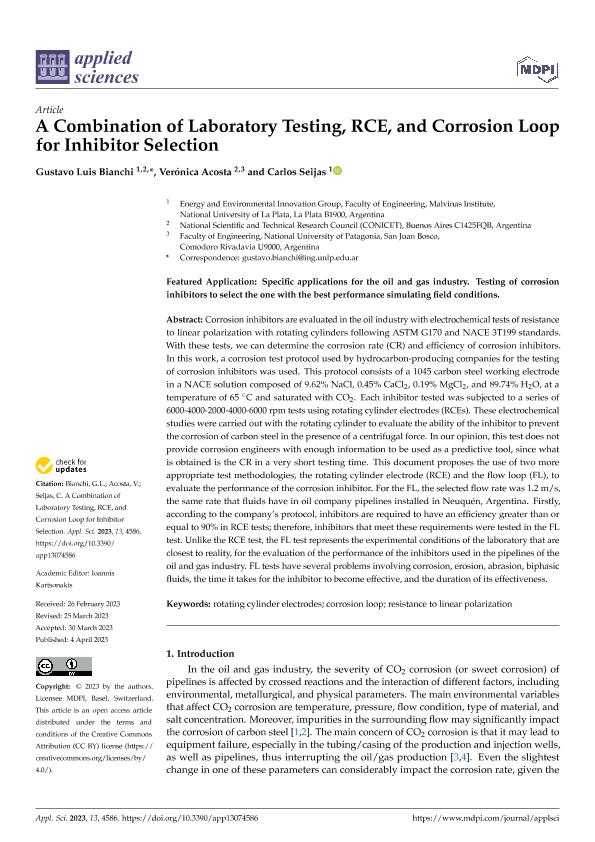Mostrar el registro sencillo del ítem
dc.contributor.author
Bianchi, Gustavo Luis

dc.contributor.author
Acosta, Verónnica Viviana

dc.contributor.author
Seijas, Carlos
dc.date.available
2023-12-01T16:00:26Z
dc.date.issued
2023-04
dc.identifier.citation
Bianchi, Gustavo Luis; Acosta, Verónnica Viviana; Seijas, Carlos; A Combination of Laboratory Testing, RCE, and Corrosion Loop for Inhibitor Selection; Multidisciplinary Digital Publishing Institute; Applied Sciences; 13; 7; 4-2023; 1-12
dc.identifier.issn
2076-3417
dc.identifier.uri
http://hdl.handle.net/11336/219048
dc.description.abstract
Featured Application: Specific applications for the oil and gas industry. Testing of corrosion inhibitors to select the one with the best performance simulating field conditions. Corrosion inhibitors are evaluated in the oil industry with electrochemical tests of resistance to linear polarization with rotating cylinders following ASTM G170 and NACE 3T199 standards. With these tests, we can determine the corrosion rate (CR) and efficiency of corrosion inhibitors. In this work, a corrosion test protocol used by hydrocarbon-producing companies for the testing of corrosion inhibitors was used. This protocol consists of a 1045 carbon steel working electrode in a NACE solution composed of 9.62% NaCl, 0.45% CaCl2, 0.19% MgCl2, and 89.74% H2O, at a temperature of 65 °C and saturated with CO2. Each inhibitor tested was subjected to a series of 6000-4000-2000-4000-6000 rpm tests using rotating cylinder electrodes (RCEs). These electrochemical studies were carried out with the rotating cylinder to evaluate the ability of the inhibitor to prevent the corrosion of carbon steel in the presence of a centrifugal force. In our opinion, this test does not provide corrosion engineers with enough information to be used as a predictive tool, since what is obtained is the CR in a very short testing time. This document proposes the use of two more appropriate test methodologies, the rotating cylinder electrode (RCE) and the flow loop (FL), to evaluate the performance of the corrosion inhibitor. For the FL, the selected flow rate was 1.2 m/s, the same rate that fluids have in oil company pipelines installed in Neuquén, Argentina. Firstly, according to the company’s protocol, inhibitors are required to have an efficiency greater than or equal to 90% in RCE tests; therefore, inhibitors that meet these requirements were tested in the FL test. Unlike the RCE test, the FL test represents the experimental conditions of the laboratory that are closest to reality, for the evaluation of the performance of the inhibitors used in the pipelines of the oil and gas industry. FL tests have several problems involving corrosion, erosion, abrasion, biphasic fluids, the time it takes for the inhibitor to become effective, and the duration of its effectiveness.
dc.format
application/pdf
dc.language.iso
eng
dc.publisher
Multidisciplinary Digital Publishing Institute
dc.rights
info:eu-repo/semantics/openAccess
dc.rights.uri
https://creativecommons.org/licenses/by/2.5/ar/
dc.subject
CORROSION LOOP
dc.subject
RESISTANCE TO LINEAR POLARIZATION
dc.subject
ROTATING CYLINDER ELECTRODES
dc.subject.classification
Ingeniería de los Materiales

dc.subject.classification
Ingeniería de los Materiales

dc.subject.classification
INGENIERÍAS Y TECNOLOGÍAS

dc.title
A Combination of Laboratory Testing, RCE, and Corrosion Loop for Inhibitor Selection
dc.type
info:eu-repo/semantics/article
dc.type
info:ar-repo/semantics/artículo
dc.type
info:eu-repo/semantics/publishedVersion
dc.date.updated
2023-11-28T14:54:03Z
dc.journal.volume
13
dc.journal.number
7
dc.journal.pagination
1-12
dc.journal.pais
Suiza

dc.journal.ciudad
Basel
dc.description.fil
Fil: Bianchi, Gustavo Luis. Universidad Nacional de La Plata. Facultad de Ingeniería. Instituto Malvinas; Argentina. Consejo Nacional de Investigaciones Científicas y Técnicas. Centro Científico Tecnológico Conicet - La Plata; Argentina
dc.description.fil
Fil: Acosta, Verónnica Viviana. Universidad Nacional de la Patagonia "San Juan Bosco"; Argentina. Consejo Nacional de Investigaciones Científicas y Técnicas; Argentina
dc.description.fil
Fil: Seijas, Carlos. Universidad Nacional de La Plata. Facultad de Ingeniería. Instituto Malvinas; Argentina
dc.journal.title
Applied Sciences
dc.relation.alternativeid
info:eu-repo/semantics/altIdentifier/url/https://www.mdpi.com/2076-3417/13/7/4586
dc.relation.alternativeid
info:eu-repo/semantics/altIdentifier/doi/https://doi.org/10.3390/app13074586
Archivos asociados
